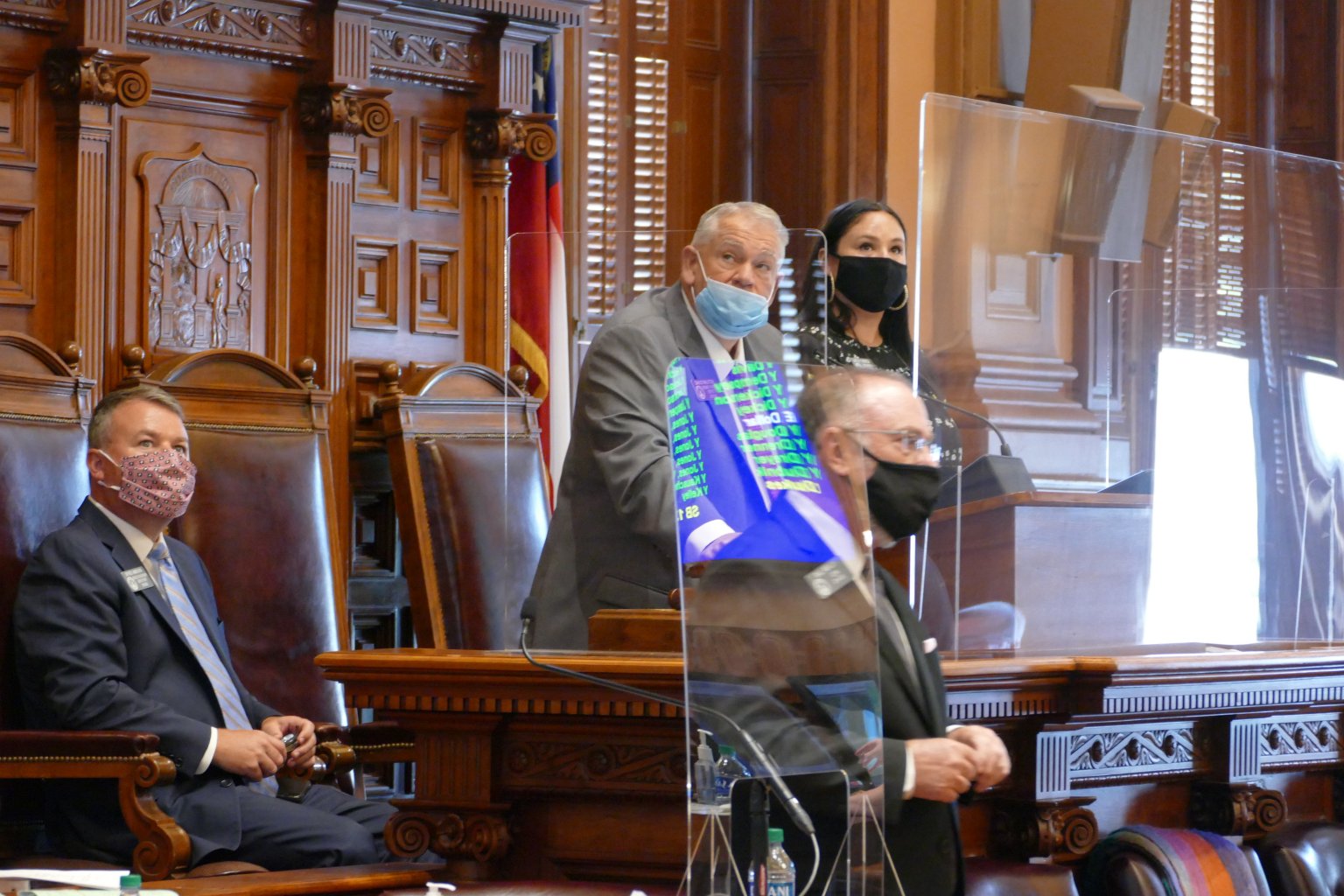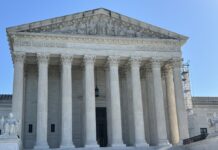
Georgia lawmakers issued passionate pleas to get a hate crimes law on the books this year as legislators returned to the Capitol for the first time since a three-month hiatus prompted by the coronavirus pandemic.
Lawmakers have 10 days left in the 2020 legislative session to pass a law that could add prison time to sentences for crimes committed against someone based on a prejudice against identity characteristics such as race and sexuality.
A couple of dozen protesters from a Georgia NAACP rally that attracted thousands of people to the streets outside the Capitol made their way inside under the rotunda on Monday. The hate crimes legislation stalled in a Senate committee last year and some in the chamber are ready to send it to the governor’s desk before the General Assembly adjourns.
“The pain that’s being expressed in the streets today by a great deal of our citizenry who are really, really hurting and demanding and praying for answers out there and some kind of reaction and response from us,” said Sen. Ed Harbison, a Columbus Democrat and legislator since 1993.
The chances that hate crimes legislation could finally pass – and even a revision of the state’s citizen’s arrest bill that is not yet filed – rapidly grew since May when a viral video showed the shooting death of Brunswick’s Ahmaud Arbery. Since then, the deaths of George Floyd in Minneapolis, Breonna Taylor in Louisville, Kentucky, and last Friday Rayshard Brooks of Atlanta have spurred demonstrations across Georgia and beyond.
The hate crimes bill has a powerful backer in Georgia House Speaker David Ralston, who spoke forcefully in favor of it in his chamber Monday.
Failing to pass the law this year would place a “stain on this state that we can never wash away,” Ralston said.
“All Georgians were shocked by the senseless murder of Ahmaud Arbery, who was hunted down like an animal and shot with a shotgun at point-blank range and then we later learned that the shooter stood over his body as his life ebbed away and pronounced his benediction with the most vile of racial slurs,” Ralston said.
“Members of this body, that is hate,” he said to applause from state representatives who were spaced out in the House chamber due to social distancing requirements.
On Monday, Republican Rep. Jeff Jones, of Brunswick, announced his plans to file a “Citizens Detainment Act” legislation limiting anyone’s ability to make a citizen’s arrest.
“Such law must make it abundantly clear that a true ‘arrest’ should only be performed by law enforcement officers,” he said in a statement.
Jones’ proposal will need to navigate a difficult path through both legislative chambers, but the Georgia Hate Crimes Act already cleared the House and now is held up in a Senate committee.
Republican Lt. Gov. Geoff Duncan has said he wants to strengthen any hate crimes bill by adding data collection, uniform reporting and potentially an avenue for civil recourse. However, any changes to the bill will send it back to the House for approval, where it narrowly passed last year.
Sen. Lester Jackson, a Savannah Democrat, said he is hopeful that the time is ripe for hate crime legislation to pass as bipartisan support keeps growing.
“For the past three years, I have introduced hate crime legislation,” Jackson said. “The good news is more people are listening. The good news is now it’s not just a Democratic issue.”
Masks and open spaces on first day
Georgia lawmakers also got more acquainted Monday with wearing masks and taking other safety precautions at the Capitol to protect against the COVID-19 pandemic.
The 180 members of the House split between the chamber floor, gallery, and a neighboring room. So, instead of voting by machines at their desks, representatives cast voice votes.
Just getting through Monday’s roll call took about 12 minutes when it normally takes one.
“It’s hard to put into words when you’re so used to something and then it’s completely changed,” said Rep. Timothy Barr, a Lawrenceville Republican. “From wearing a mask to changing your seat location to a roll call vote instead of, you know, pushing your button.”
House members were required to wear masks, but the Senate was mask-optional. Still, most Senators wore a cover over at least their mouths.
Lawmakers’ temperatures were checked inside the building and more hand sanitizer dispensers were available throughout.
“Overall, it was about getting people used to what we’re going to be doing to keep people safe while we’re here and the protocols,” Rep. Trey Rhodes said.
It might take some getting used to. A sneeze or cough is more likely to draw attention than it did three months ago when the Legislature abruptly adjourned.
“Excuse me, that’s not a COVID cough. That’s an I-got-choked cough,” Sen. Ben Watson, a Savannah Republican, assured people at the Senate Health and Human Services Committee meeting Monday afternoon.
For comprehensive statewide news coverage, visit Georgia Recorder online






